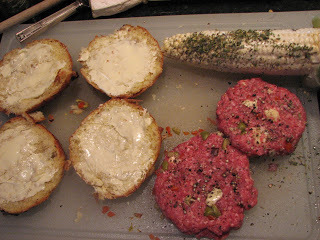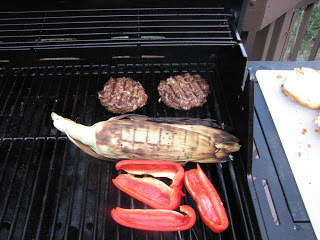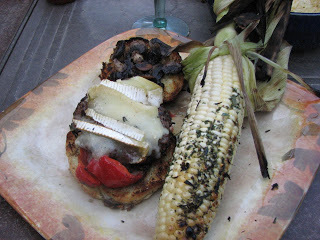Suzanne Elizabeth Anderson's Blog, page 22
July 11, 2012
What are the challenges you face as a writer in your genre?
Week Seven in the Writerly Chronicles from my Orangeberry Book Tour:

If you asked me what type of book I write, I’d tell you that
I write mainstream women’s fiction with a Christian perspective. In other
words, I write stories that reflect my view of the world. For instance, God is
an essential and important part of my life, yet I am constantly questioning His
presence in my life and how I should live in relation with Him.
This perspective may become a challenge within traditional Christian
fiction, because I question as much as I proselytize. My writing might be too
worldly for the some Christian readers. For instance, one reviewer remarked
that she found my use of a few swear words in my first novel, Mrs. Tuesday’s
Departure, to be offensive. I wrote back and apologized that she was offended.
However, given the fact that I was writing a novel set in war-time, I felt the
sparing use of those words was within bounds.
On the other hand, I would not be inclined to write an
explicit sex scene, even between husband and wife, and then try to publish it
as a Christian novel.
In other words, no matter what genre you choose, your
readers will have certain expectations of your book. If you want to write for
that genre, you need to respect the guidelines while remaining true to your
story and your unique voice. If you find that overly confining, then choose
another genre.
Which is not to say that you cannot be original or break new
ground in an established genre. You can, and it may be your originality might
be rewarded with greater sales. However, I also believe it’s important to
respect my readers, while I entertain them. I want them to remember my book for
the wonderful story that transported them into another world, rather than
shocked and dismayed.
What say you? Are there certain expectations that you bring
to a book?














If you asked me what type of book I write, I’d tell you that
I write mainstream women’s fiction with a Christian perspective. In other
words, I write stories that reflect my view of the world. For instance, God is
an essential and important part of my life, yet I am constantly questioning His
presence in my life and how I should live in relation with Him.
This perspective may become a challenge within traditional Christian
fiction, because I question as much as I proselytize. My writing might be too
worldly for the some Christian readers. For instance, one reviewer remarked
that she found my use of a few swear words in my first novel, Mrs. Tuesday’s
Departure, to be offensive. I wrote back and apologized that she was offended.
However, given the fact that I was writing a novel set in war-time, I felt the
sparing use of those words was within bounds.
On the other hand, I would not be inclined to write an
explicit sex scene, even between husband and wife, and then try to publish it
as a Christian novel.
In other words, no matter what genre you choose, your
readers will have certain expectations of your book. If you want to write for
that genre, you need to respect the guidelines while remaining true to your
story and your unique voice. If you find that overly confining, then choose
another genre.
Which is not to say that you cannot be original or break new
ground in an established genre. You can, and it may be your originality might
be rewarded with greater sales. However, I also believe it’s important to
respect my readers, while I entertain them. I want them to remember my book for
the wonderful story that transported them into another world, rather than
shocked and dismayed.
What say you? Are there certain expectations that you bring
to a book?












Published on July 11, 2012 10:56
July 2, 2012
Goodreads Giveaway for Chester Blue!

To celebrate the launch of my second book, I'm giving away FIVE beautiful paperback copies of God Loves You. -Chester Blue at Goodreads.com. Just click the link and enter to win!












Published on July 02, 2012 07:21
June 29, 2012
Week-Ending: A Commonplace Book

I've always thought that Morning Pages, as suggested in Julia Cameron's The Artist's Way , were a brilliant way to get the mind out of the way of the writer's imagination. Which is why I was tickled pink to find this much earlier positing of the same idea in Brenda Ueland's classic book on writing:
That is why I think it is good to keep a diary. I don't mean a "had lunch" diary. But do this: write every day, or as often as y ou possible can, as fast and carelessly as you possibly can, without reading it again,a nything you happened to have thought, seen or felt the day before.
In six months look at it. A drawer full of paper will ahve accumulated. You will see that what you have written with the most slovenly freedom - in those parts there will be vitality, brilliance, beauty.
from:
Brenda Ueland
IF YOU WANT TO WRITE












Published on June 29, 2012 00:00
June 27, 2012
Writing to me is …my legacy.
Week Six in the Writerly Chronicles from my Orangeberry Book Tour:

On a
warm summer afternoon in 1994, as I walked home from my job as Assistant Vice
President in Corporate Finance for a Japanese Investment Bank, I paused, looked
at the wall of skyscrapers that surrounded me, and had an epiphany. As much as
I loved working on Wall Street, I suddenly understood that when it was my turn
to retire, my absence would not be noteworthy. There would simply be someone
else to take my place.
Then I
thought of my mother who was retiring that year, who’d spent her entire career
in early childhood education, and who, upon retirement boarded a plane to work
in an international school in the former-Soviet Union. When she got up from her
desk, she left a living legacy of children who had learned to read through her
efforts.
Then I
thought of my brother John, who is a building contractor, who could drive me
around his hometown and show me the historic homes that he’d brought back to
life, the clients he’d helped to create a dream home. He is an American success
story. With his wife Heidi, he’s built a business that operates on principles
of integrity and quality work. His legacy is as tangible as the windows that
open up to a water view.
My
epiphany that day was that I wanted to leave New York and find my own legacy.
Of course, at the time, I had no idea of what it would be.
It was
actually my other sister-in-law, Kathy, who provided a nudge in the ‘write’
direction. After I’d left New York and spent more time poolside than I care to
admit, with a glass of wine in one hand and a book on ‘discovering your perfect
career’ in the other, Kathy called and shared a newspaper article she’d read
about romance authors and suggested that since I obviously liked to read, perhaps
I should try writing.
Did I
start to write just because Kathy told me to? No. Actually, I wrote my first
book at the age of 5 and have had a life-long love affair with writing.
However, Kathy’s encouragement was the impetus to overcome a history of what
Brenda Ueland called ‘helpful criticism’, in her classic work, “If You Want to
Write”. As my mother loved teaching, as my brother loved building, I have
always loved books. But after one high school teacher discouraged my early
writing efforts, I buried the revelation I experienced when I read a book, the
singular desire to ‘do that too’, for the more practical pursuit of a career in
business.
Unfortunately,
recognizing a desire is not the same as creating a new life. I spent the next
several years writing, submitting, getting rejected, and getting discouraged. I
wrote four novels and several children’s books. And while I loved writing, my
books found no home, so back I went into business.
Then
last year with a desire to simply see my work in print, I took the plunge into
self-publishing. I published Mrs. Tuesday’s Departure in a much edited
form, changing the setting from World War Two Budapest to a dystopian European
city, changing the First Person POV to Third Person, and completely eliminating
the original spiritual message. All in the name of creating what I thought
would be a more commercial version of the book I’d originally written. And as
what happens when something is not its true self, it went nowhere.
In
February of this year, I re-published Mrs. Tuesday in her original version and
finally discovered my authentic writer’s voice….a cross between literary
fiction and religious fiction, a contemporary woman who loves God passionately,
but sometimes wonders if He’s really listening. As a result, I discovered that
this was the underlying voice in all of my books and one that I was ready to
share. Once I embraced this authenticity, I felt more confident about my work
and my purpose.
Finally, let me leave you with two
quick illustrations of why writing is my legacy: The other day I was reading
Cynthia Rylant’s children’s book The Heavenly Village. Its unflinching
beauty brought tears to my eyes and filled me with an overwhelming hope that I
will someday write a book that will have a similar impact. And then, a week
before, I was at my desk working on the final draft of my next book and as I
looked up from my desk and out the window, I realized that if I had a week to
live, this is how I would choose to spend it. I would want to publish my next
two books. These books would be my legacy. I have finally found
the answer to the question I asked nearly twenty years ago on the Brooklyn
Bridge.














On a
warm summer afternoon in 1994, as I walked home from my job as Assistant Vice
President in Corporate Finance for a Japanese Investment Bank, I paused, looked
at the wall of skyscrapers that surrounded me, and had an epiphany. As much as
I loved working on Wall Street, I suddenly understood that when it was my turn
to retire, my absence would not be noteworthy. There would simply be someone
else to take my place.
Then I
thought of my mother who was retiring that year, who’d spent her entire career
in early childhood education, and who, upon retirement boarded a plane to work
in an international school in the former-Soviet Union. When she got up from her
desk, she left a living legacy of children who had learned to read through her
efforts.
Then I
thought of my brother John, who is a building contractor, who could drive me
around his hometown and show me the historic homes that he’d brought back to
life, the clients he’d helped to create a dream home. He is an American success
story. With his wife Heidi, he’s built a business that operates on principles
of integrity and quality work. His legacy is as tangible as the windows that
open up to a water view.
My
epiphany that day was that I wanted to leave New York and find my own legacy.
Of course, at the time, I had no idea of what it would be.
It was
actually my other sister-in-law, Kathy, who provided a nudge in the ‘write’
direction. After I’d left New York and spent more time poolside than I care to
admit, with a glass of wine in one hand and a book on ‘discovering your perfect
career’ in the other, Kathy called and shared a newspaper article she’d read
about romance authors and suggested that since I obviously liked to read, perhaps
I should try writing.
Did I
start to write just because Kathy told me to? No. Actually, I wrote my first
book at the age of 5 and have had a life-long love affair with writing.
However, Kathy’s encouragement was the impetus to overcome a history of what
Brenda Ueland called ‘helpful criticism’, in her classic work, “If You Want to
Write”. As my mother loved teaching, as my brother loved building, I have
always loved books. But after one high school teacher discouraged my early
writing efforts, I buried the revelation I experienced when I read a book, the
singular desire to ‘do that too’, for the more practical pursuit of a career in
business.
Unfortunately,
recognizing a desire is not the same as creating a new life. I spent the next
several years writing, submitting, getting rejected, and getting discouraged. I
wrote four novels and several children’s books. And while I loved writing, my
books found no home, so back I went into business.
Then
last year with a desire to simply see my work in print, I took the plunge into
self-publishing. I published Mrs. Tuesday’s Departure in a much edited
form, changing the setting from World War Two Budapest to a dystopian European
city, changing the First Person POV to Third Person, and completely eliminating
the original spiritual message. All in the name of creating what I thought
would be a more commercial version of the book I’d originally written. And as
what happens when something is not its true self, it went nowhere.
In
February of this year, I re-published Mrs. Tuesday in her original version and
finally discovered my authentic writer’s voice….a cross between literary
fiction and religious fiction, a contemporary woman who loves God passionately,
but sometimes wonders if He’s really listening. As a result, I discovered that
this was the underlying voice in all of my books and one that I was ready to
share. Once I embraced this authenticity, I felt more confident about my work
and my purpose.
Finally, let me leave you with two
quick illustrations of why writing is my legacy: The other day I was reading
Cynthia Rylant’s children’s book The Heavenly Village. Its unflinching
beauty brought tears to my eyes and filled me with an overwhelming hope that I
will someday write a book that will have a similar impact. And then, a week
before, I was at my desk working on the final draft of my next book and as I
looked up from my desk and out the window, I realized that if I had a week to
live, this is how I would choose to spend it. I would want to publish my next
two books. These books would be my legacy. I have finally found
the answer to the question I asked nearly twenty years ago on the Brooklyn
Bridge.












Published on June 27, 2012 10:51
June 25, 2012
Welcome to the World Chester Blue!

Today I am happy to announce the arrival of my second book.
It's available on Kindle and in paperback.
Chester Blue is a children's chapter book consisting of ten linked stories of encouragement that will appeal to children and adults. Here's the back cover copy:
What if when you most needed help,
a blue bear appeared with a note from God?
One night, Miss Millie of Blossom, Ohio turns her face to the stars and asks God for help. The next day, a package arrives on her doorstep containing a blue teddy bear and a special note.
Over the course of a year, this remarkable blue bear travels across the country, showing up just when he’s needed most.
During his journey, Chester Blue helps a young girl trying to impress her big sisters; saves a sailor caught in a terrible storm; reunites two constantly fighting brothers; helps a cowboy become a rodeo clown; and aids a father and daughter in bonding after divorce.
If you ever needed a message from God, it's here...
Beginning July 3rd I'll be on a month long blog tour and I'll be doing a few giveaways as well.
Please help me to welcome Chester Blue into the world by sharing this post on Facebook or Tweeting about it on Twitter!
Many thanks !












Published on June 25, 2012 07:43
June 22, 2012
Week-ending: A Commonplace Book
Gradually by writing you will learn more and more to be free, to say all you think; and at the same time you will learn never to lie to yourself, never to pretend and attitudinize. But only by writing and by long, patient, serious work will you find your true self.
-Brenda Ueland
IF YOU WANT TO WRITE:
A Book About Art, Independence and Spirit












-Brenda Ueland
IF YOU WANT TO WRITE:
A Book About Art, Independence and Spirit












Published on June 22, 2012 03:00
June 20, 2012
Do’s and Don’ts for the Beginning (and Experienced) Writer
Week Five in the Writerly Chronicles from my Orangeberry Book Tour:

1. Do read widely. Yes, you must read
historical romances if you want to write historical romances. There are familiar
styles and jargon that readers expect, as well as trends in the market that you
would be wise to know. On the other hand, don’t limit your reading menu to only
the books you intend to write. Broaden your literary and imaginative horizons
by reading widely. Think of this as you would your daily diet. Although I love
chocolate (too much), I appreciate it so much more when I’ve enjoyed a widely
varied palate of foods. Your writing mind will thank you if you’ve fed it a
colorful diet of fiction and non-fiction, poetry and cookbooks. Okay, maybe the
cookbooks are just for me.
2. Don’t talk about wanting to write your
first novel. Write it. It has never been easier to become a published
author. So if you truly want to be one, then start writing and don’t stop until
you’ve reached the end. Attending conferences, reading books about writing,
sharing your writing journey with your friends on Twitter or Facebook, are all
wonderful parts of the writer’s life. But the most essential part is actually
finishing that book! And do finish it. Get the first draft down as quickly as
you can so that none of the above distractions will keep you from reaching your
goal. Once you’ve finished the first draft, pat yourself on the back, tweet all
your friends, post a pictures of the manuscript you’ve printed out on
Instagram, and then go back to work. When you finally bring your book to the
market, either through a traditional publisher or through self-publishing, you
will win the well-deserved praise of your friends and family.
3. Don’t let the negative criticism of others
stand in your way. Trying anything for the first time, such as writing a
novel, can be intimidating. Most of your friends and family will be incredibly
encouraging and generously tell you that they believe in you, just when you no
longer believe in yourself. Savor those words and hold them in your mind when
the fear of failure begins muttering in your ear. You’ll especially need those
kind words when some unknowing or worse, uncaring, buffoon attempts to rain on
your writing parade by telling you that there are too many writers in the
world. That you’ve never been successful at anything, so why would you be able to write a book. And that
self-publishing your book isn’t as valid as getting published by a traditional
publisher. Those words are not the truth. They are a distraction. They are
meant to keep you from achieving your dream. Which is why you must ignore them
and keep writing.
4. Never give up. Or let a lack of funds stand
keep you from publishing your book. Keep writing until you’ve finished your
story. And then begin the hard work of getting it published. If you choose to
pursue traditional publishing, start writing those query letters to literary
agents. If money is a concern, go to the library speak with a reference
librarian, who will gladly provide you incredible resources for finding and
reaching out to agents and publishers. Many of these resources can also be
found online for free, as well. If you choose to self-publish, don’t feel that
you must wait until you can afford the fees associated with obtaining a
professionally designed book cover, a beautiful book trailer, a professional
editor, an industry recognized reviewer. Yes, all of those things are wonderful
and sure to help you launch your book. But, with the help of your capable
friends, and the free online resources such as Amazon.com KDP service or
Createspace, you can literally publish your novel for free. One caveat: Line
editing your manuscript is essential. If you can’t find a professional editor,
try trading editing services with a writing friend.

5. Pay it forward. Once you’ve achieved
your dream, soak up the adulation, revel in the notoriety, and then pay it
forward. Share your hard-earned platform with another aspiring author. There
are plenty of readers to go around, you won’t be losing yours by introducing
them to your friend’s literary debut. Make it your goal to be the most generous
of your writing friends and you’ll never be poor. And no, I’m not talking about
money. But you knew that, didn’t you!














1. Do read widely. Yes, you must read
historical romances if you want to write historical romances. There are familiar
styles and jargon that readers expect, as well as trends in the market that you
would be wise to know. On the other hand, don’t limit your reading menu to only
the books you intend to write. Broaden your literary and imaginative horizons
by reading widely. Think of this as you would your daily diet. Although I love
chocolate (too much), I appreciate it so much more when I’ve enjoyed a widely
varied palate of foods. Your writing mind will thank you if you’ve fed it a
colorful diet of fiction and non-fiction, poetry and cookbooks. Okay, maybe the
cookbooks are just for me.
2. Don’t talk about wanting to write your
first novel. Write it. It has never been easier to become a published
author. So if you truly want to be one, then start writing and don’t stop until
you’ve reached the end. Attending conferences, reading books about writing,
sharing your writing journey with your friends on Twitter or Facebook, are all
wonderful parts of the writer’s life. But the most essential part is actually
finishing that book! And do finish it. Get the first draft down as quickly as
you can so that none of the above distractions will keep you from reaching your
goal. Once you’ve finished the first draft, pat yourself on the back, tweet all
your friends, post a pictures of the manuscript you’ve printed out on
Instagram, and then go back to work. When you finally bring your book to the
market, either through a traditional publisher or through self-publishing, you
will win the well-deserved praise of your friends and family.
3. Don’t let the negative criticism of others
stand in your way. Trying anything for the first time, such as writing a
novel, can be intimidating. Most of your friends and family will be incredibly
encouraging and generously tell you that they believe in you, just when you no
longer believe in yourself. Savor those words and hold them in your mind when
the fear of failure begins muttering in your ear. You’ll especially need those
kind words when some unknowing or worse, uncaring, buffoon attempts to rain on
your writing parade by telling you that there are too many writers in the
world. That you’ve never been successful at anything, so why would you be able to write a book. And that
self-publishing your book isn’t as valid as getting published by a traditional
publisher. Those words are not the truth. They are a distraction. They are
meant to keep you from achieving your dream. Which is why you must ignore them
and keep writing.
4. Never give up. Or let a lack of funds stand
keep you from publishing your book. Keep writing until you’ve finished your
story. And then begin the hard work of getting it published. If you choose to
pursue traditional publishing, start writing those query letters to literary
agents. If money is a concern, go to the library speak with a reference
librarian, who will gladly provide you incredible resources for finding and
reaching out to agents and publishers. Many of these resources can also be
found online for free, as well. If you choose to self-publish, don’t feel that
you must wait until you can afford the fees associated with obtaining a
professionally designed book cover, a beautiful book trailer, a professional
editor, an industry recognized reviewer. Yes, all of those things are wonderful
and sure to help you launch your book. But, with the help of your capable
friends, and the free online resources such as Amazon.com KDP service or
Createspace, you can literally publish your novel for free. One caveat: Line
editing your manuscript is essential. If you can’t find a professional editor,
try trading editing services with a writing friend.

5. Pay it forward. Once you’ve achieved
your dream, soak up the adulation, revel in the notoriety, and then pay it
forward. Share your hard-earned platform with another aspiring author. There
are plenty of readers to go around, you won’t be losing yours by introducing
them to your friend’s literary debut. Make it your goal to be the most generous
of your writing friends and you’ll never be poor. And no, I’m not talking about
money. But you knew that, didn’t you!












Published on June 20, 2012 10:47
June 18, 2012
Olive - Brie Burgers on the Grill With a Chilled Rose Wine

After a lengthy phone conversation with my brother John, I finally learned how to turn on my gas grill. And of course, as with all new toys, I'm obsessed with using it often.
I also love hamburgers.
For this hamburger, I decided to improvise using what I had in the refrigerator, a jar of green olives and a small wedge of brie. I chopped both finely.
Oh, and before that......I poured myself a glass of my other new toy this summer....rose wine. Find a nice dry one, it's perfect wine for summer red meat grilling.

I formed the patties, sprinkled with coarsely ground pepper.
Then I buttered a couple of onion rolls.
That ear of corn has also been slathered with butter and sprinkled with herbs of Provence.

Cooking. Cooking. Cooking.

And voila!












Published on June 18, 2012 03:00
June 15, 2012
Week-Ending: A Common Place Book

"When I do what it takes to face obstacles, believing everything will work out, as it did for the Lion [in the Wizard of Oz], courage becomes the virtue that pulls me through tough situations. I believe it is not found in the opinion of another, like the Wizard, but in the core character inside of me. This is true for us all."
- Carol
from Courage: The Heart and Spirit of Every Woman
by Sandra Ford Walston












Published on June 15, 2012 19:23
June 13, 2012
Given unlimited resources, how would you change the publishing world?
Week Four in the Writerly Chronicles from my Orangeberry Book Tour:

Actually, thanks to Amazon.com and the ease with which self-publishing
has allowed anyone to enter the market, I think the publishing world is doing a
great job of going through it’s own rapid evolution and requires no help from
me. The gate-keepers of literary agents and publishing houses have, like the
little man behind the curtain in the Wizard of Oz, lost a
great deal of their power in the past few years. While they will always play a
vital and important role in the market, luckily for us, they are no longer the
only avenue to publication.
The best outcome of this revolution in publishing is that it
doesn’t take unlimited resources to play the game. The barriers to entry have
been virtually eliminated thanks to the advent of the e-reader and the
availability of venues for free publication.
Remember when you had to spend months querying agents in New
York, just hoping to find one who would represent you and your book? That
process was like playing the lottery. It could take months or you could win on
your first try. But that was only the first step.
The next wait came when your agent sent your book out to
publishers. Then the beauty contest began again. If the book was not picked up
by a publisher, you might be asked to re-write the book, your agent might drop
you, or she might wait around while you wrote a second book.
If you were lucky enough to find a publisher to take on your
book, you had to hope that it would become the victim of the revolving door of
editors moving from house to house. If you were lucky your book might see the
shelves of a bookstore one and a half years after your typed ‘The End’.
Now, all of that has changed. In my mind, for the better.
Today you can take matters into your own hands and
self-publish your work and get your book into the hands of readers immediately.
Yes, you do still need to have your work edited. An
eye-catching book cover will help you stand out from the crowd. And working up
a consistent marketing campaign will help readers to find you.
The key is that all of these opportunities and
responsibilities are now in your hands.
Which is why, in my mind, today is the best time in the
history of the world to be a writer. The only thing stopping you is your
willingness to do the work. Which means that really, you have all the unlimited
resources you could ever need!














Actually, thanks to Amazon.com and the ease with which self-publishing
has allowed anyone to enter the market, I think the publishing world is doing a
great job of going through it’s own rapid evolution and requires no help from
me. The gate-keepers of literary agents and publishing houses have, like the
little man behind the curtain in the Wizard of Oz, lost a
great deal of their power in the past few years. While they will always play a
vital and important role in the market, luckily for us, they are no longer the
only avenue to publication.
The best outcome of this revolution in publishing is that it
doesn’t take unlimited resources to play the game. The barriers to entry have
been virtually eliminated thanks to the advent of the e-reader and the
availability of venues for free publication.
Remember when you had to spend months querying agents in New
York, just hoping to find one who would represent you and your book? That
process was like playing the lottery. It could take months or you could win on
your first try. But that was only the first step.
The next wait came when your agent sent your book out to
publishers. Then the beauty contest began again. If the book was not picked up
by a publisher, you might be asked to re-write the book, your agent might drop
you, or she might wait around while you wrote a second book.
If you were lucky enough to find a publisher to take on your
book, you had to hope that it would become the victim of the revolving door of
editors moving from house to house. If you were lucky your book might see the
shelves of a bookstore one and a half years after your typed ‘The End’.
Now, all of that has changed. In my mind, for the better.
Today you can take matters into your own hands and
self-publish your work and get your book into the hands of readers immediately.
Yes, you do still need to have your work edited. An
eye-catching book cover will help you stand out from the crowd. And working up
a consistent marketing campaign will help readers to find you.
The key is that all of these opportunities and
responsibilities are now in your hands.
Which is why, in my mind, today is the best time in the
history of the world to be a writer. The only thing stopping you is your
willingness to do the work. Which means that really, you have all the unlimited
resources you could ever need!












Published on June 13, 2012 10:42
Suzanne Elizabeth Anderson's Blog
- Suzanne Elizabeth Anderson's profile
- 114 followers
Suzanne Elizabeth Anderson isn't a Goodreads Author
(yet),
but they
do have a blog,
so here are some recent posts imported from
their feed.



